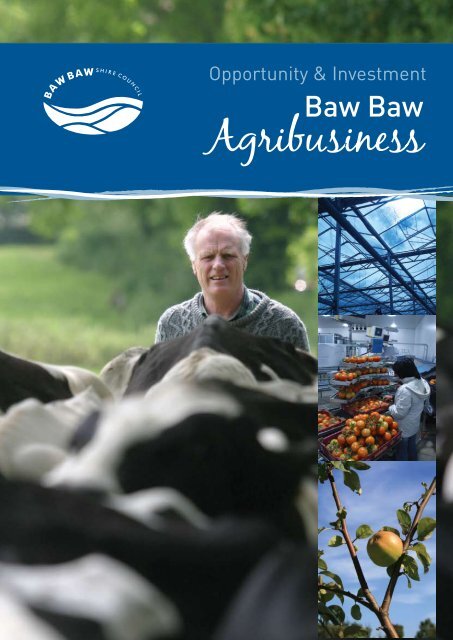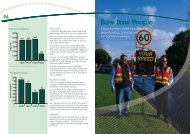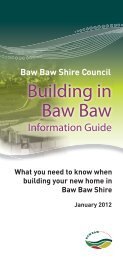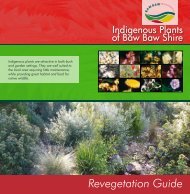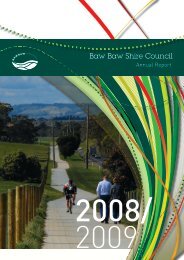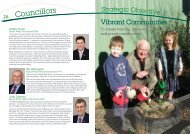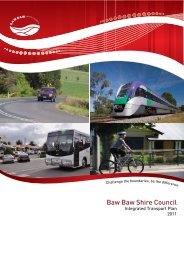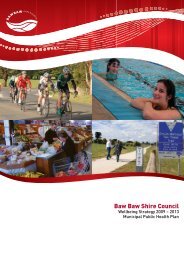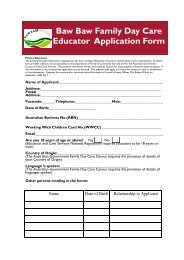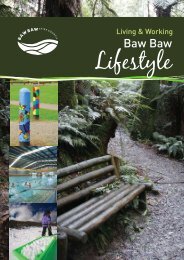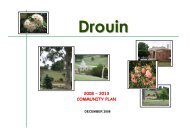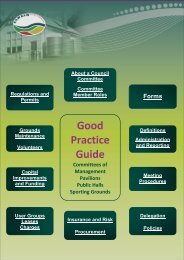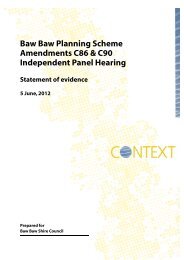Victoria - Baw Baw Shire Council
Victoria - Baw Baw Shire Council
Victoria - Baw Baw Shire Council
You also want an ePaper? Increase the reach of your titles
YUMPU automatically turns print PDFs into web optimized ePapers that Google loves.
Australia<br />
<strong>Victoria</strong>
<strong>Baw</strong> <strong>Baw</strong> <strong>Shire</strong><br />
Gippsland, <strong>Victoria</strong><br />
MELBOURNE<br />
Pakenham<br />
Tanjil Bren<br />
Nayook<br />
Noojee<br />
Rawson<br />
Neerim South<br />
Jindivick<br />
Erica<br />
Mount <strong>Baw</strong> <strong>Baw</strong><br />
National Park<br />
Walhalla<br />
Drouin<br />
Longwarry<br />
Warragul<br />
Yarragon<br />
Moe<br />
Trafalgar<br />
Traralgon<br />
Sale<br />
Thorpdale<br />
Rosebud<br />
Mirboo North<br />
Wonthaggi<br />
Inverloch<br />
Foster<br />
Yarram<br />
Wilsons Promentory
5<br />
The <strong>Baw</strong> <strong>Baw</strong> <strong>Shire</strong><br />
The <strong>Baw</strong> <strong>Baw</strong> <strong>Shire</strong> is a local government<br />
region positioned just to the east of <strong>Victoria</strong>’s<br />
capital city, Melbourne. It has long been<br />
recognised for its high quality soils and high<br />
average levels of rainfall. These two factors<br />
have helped the agribusiness sector to<br />
expand and develop into a vertically integrated<br />
industry in the <strong>Baw</strong> <strong>Baw</strong> region with transport<br />
networks, value adding businesses, support<br />
businesses and private and government<br />
research facilities.<br />
Whilst traditionally dairy has been, and still is,<br />
the major agribusiness sector the region also<br />
is known for production of beef cattle, potatoes,<br />
onions, apples, silviculture and more recently as<br />
a major producer in hydroponics.<br />
Value added production based on local<br />
agribusiness strengths include milk, milk<br />
powder, butter, soft and hard cheeses, meat,<br />
processed vegetables, wine and grape products,<br />
frozen berries, conserves, pickles and cordials,<br />
cut flowers and bulbs.<br />
The <strong>Baw</strong> <strong>Baw</strong> <strong>Shire</strong> <strong>Council</strong> is seeking to further<br />
expand the agribusiness sector within the <strong>Shire</strong>.<br />
<strong>Baw</strong> <strong>Baw</strong> <strong>Shire</strong><br />
ABS Agricultural Statistics Summary<br />
CATEGORY VALUE A$ % OF VIC PRODUCTION<br />
Apples $5.7 mill 3.3<br />
Berries TOTAL $849,000 1.3<br />
Blueberries $571,000 11.4<br />
Raspberries $278,000 3.61<br />
Broadacre Crops $344,000 1.9<br />
Cut Flowers $6.35 mill 4.4<br />
Eggs $7.95 mill N/A<br />
Fruit TOTAL $6.9 mill 0.68<br />
Livestock Slaughtered $63.5 mill 2.5<br />
Milk $133.98 mill 20<br />
Nurseries $8.7 mill 3.2<br />
Onions $2.27 mill 35<br />
Orchard Fruit $6 mill 1<br />
Potatoes $33.8 mill 29<br />
Seed Potatoes $9.54 mill 31.9<br />
Tomatoes - Hydroponic (2009) $28 mill N/A<br />
Veg For Seed TOTAL $9.62 mill 29<br />
Vegetables TOTAL $37.8 mill 6<br />
Wool $947,739 0.2<br />
TOTAL AGRICULTURE $314,381,000
6<br />
Dairy
7<br />
Located in the Gippsland region of <strong>Victoria</strong>,<br />
Australia, the <strong>Baw</strong> <strong>Baw</strong> <strong>Shire</strong> region is home<br />
to a strong and vibrant dairy industry based on<br />
the region’s high yielding, high value farmland<br />
and favourable climate.<br />
Value added production includes world and<br />
national award-winning cheeses, dairy based<br />
dips, milk powder and other dairy based<br />
products.<br />
Opportunities exist for expansion and<br />
diversification into value added activities based<br />
on local supplies and proximity to Melbourne<br />
and its markets and ports.<br />
The <strong>Baw</strong> <strong>Baw</strong> region has 163,410 hectares<br />
of land classified by the <strong>Victoria</strong>n State<br />
Government as highly suitable for pasture<br />
production.<br />
Well drained soils, a favourable temperate<br />
climate and a long term average rainfall in<br />
excess of 1,000mm per annum provide good<br />
growing conditions for perennial ryegrass and<br />
white clover.<br />
Suitable zoned land and necessary<br />
infrastructure is also available for value adding<br />
developments in the region.<br />
Milk production in <strong>Baw</strong> <strong>Baw</strong> <strong>Shire</strong> in 2007/08<br />
was estimated at 583million litres with a farm<br />
gate value of A$285million.<br />
Milk solids were estimated at 43,230tonnes<br />
with a farm gate value of $283.6million, with<br />
large portions of this taken by local milk powder<br />
manufacturers and cheese makers.<br />
<strong>Baw</strong> <strong>Baw</strong> region can justifiably claim to be home<br />
to some of Australia’s and the World’s best dairy<br />
industries.<br />
Industry in Focus<br />
Dairy<br />
The dairy industry in <strong>Baw</strong> <strong>Baw</strong> <strong>Shire</strong> has<br />
a strong and innovative support network.<br />
It includes government employed dairy<br />
extension staff, scientists and research<br />
facilities, milk factory field staff, agronomists,<br />
machinery and equipment businesses and<br />
agricultural consultants.<br />
The <strong>Victoria</strong>n Government’s only dairy<br />
research centre is located a Ellinbank just<br />
south of Warragul.<br />
The Ellinbank Dairy Research Centre conducts<br />
leading edge research on grazing systems,<br />
sustainable production, environmental<br />
management, nutrient and biodiversity and<br />
many other industry priorities.<br />
The presence of nationally and internationally<br />
renowned dairy scientists in the region<br />
provides high levels of support for the<br />
industry.<br />
The dairy group, GippsDairy, also has it’s<br />
main office in Warragul. GippsDairy is<br />
affiliated with the national service body, Dairy<br />
Australia, which is mainly funded by farmers’<br />
milk levies.<br />
GippsDairy works to enhance dairying in<br />
Gippsland. it does this mainly through<br />
leveraging funds for projects aimed at<br />
improving profitability and technical<br />
knowledge. It also takes on a communication<br />
and leadership role as required.
9<br />
Potatoes & Onions<br />
The <strong>Baw</strong> <strong>Baw</strong> <strong>Shire</strong> region is a major producer of<br />
onions and seed and table potatoes based on the<br />
region’s high yielding, high value farmland and<br />
favourable climate.<br />
Opportunities exist for expansion and<br />
diversification into value added activities based<br />
on local supplies and proximity to Melbourne and<br />
its markets and ports.<br />
The <strong>Baw</strong> <strong>Baw</strong> region has 44,753 hectares of land<br />
classified by the <strong>Victoria</strong>n State Government as<br />
highly suitable and 102,490 hectares classified as<br />
moderately suitable for growing of potatoes. Well<br />
drained soils, a favourable temperate climate and<br />
average rainfall in excess of 1,000mm per annum<br />
provide good growing conditions.<br />
Suitable zoned land and necessary infrastructure<br />
is also available for value adding developments in<br />
the region.<br />
<strong>Baw</strong> <strong>Baw</strong> Agribusiness<br />
Quick Stats -<br />
Potatoes & Onions<br />
• <strong>Baw</strong> <strong>Baw</strong> <strong>Shire</strong> produces 21% of<br />
<strong>Victoria</strong>’s total potato production for<br />
table use.<br />
• <strong>Baw</strong> <strong>Baw</strong> <strong>Shire</strong> produces 32%<br />
of <strong>Victoria</strong>’s total seed potato<br />
production.<br />
• Seed potatoes are worth<br />
A$9.54million to the <strong>Baw</strong> <strong>Baw</strong> <strong>Shire</strong><br />
economy.<br />
• Table potatoes were worth<br />
A$33.8million to the <strong>Baw</strong> <strong>Baw</strong> <strong>Shire</strong><br />
economy in 2006.<br />
• <strong>Baw</strong> <strong>Baw</strong> <strong>Shire</strong>’s total onion<br />
production is worth $2.72million<br />
equivalent to 35% of <strong>Victoria</strong>n<br />
production.<br />
ABS: Agricultural Commodities: Small Area Data,<br />
Australia, 2005-06
11<br />
Vegetables<br />
The <strong>Baw</strong> <strong>Baw</strong> <strong>Shire</strong> region produces a wide range<br />
of vegetables based on the region’s high yielding,<br />
high value farmland and favourable climate.<br />
Opportunities exist for diversification into other<br />
primary crops and value added production based<br />
on local production and proximity to Melbourne<br />
and its markets and ports.<br />
<strong>Baw</strong> <strong>Baw</strong> Agribusiness<br />
Quick Stats - Vegetables<br />
c <strong>Baw</strong> <strong>Shire</strong> produced 35% of <strong>Victoria</strong>’s<br />
total production of onions in<br />
2006/2007<br />
The <strong>Baw</strong> <strong>Baw</strong> region has 57,382 hectares of land<br />
classified by the <strong>Victoria</strong>n State Government as<br />
highly suitable and 85,415 hectares classified<br />
as moderately suitable for growing of brassicas<br />
and artichokes. Well drained soils, a favourable<br />
temperate climate and average rainfall in excess<br />
of 1,000mm per annum provide good growing<br />
conditions. Suitable zoned land and necessary<br />
infrastructure is also available for value adding<br />
developments in the region.<br />
Vegetable production in <strong>Baw</strong> <strong>Baw</strong> <strong>Shire</strong> in<br />
2008/09 was estimated to be about A$65million<br />
with potatoes being the main sector with<br />
production of $33.8million. Hydroponic tomato<br />
production in 2008 was 7,000 tonnes (up from<br />
3,700 in 2006) with further expansion planned.<br />
Business in Focus<br />
Sweet Tips Asparagus<br />
Located just south of Warragul the Jones<br />
family had run a traditional potato and<br />
asparagus farm selling produce wholesale,<br />
retail and to export markets.<br />
In 2004 the Jones family branched out and<br />
formed Sweet Tips Asparagus, a family owned<br />
business, to value add to primary production<br />
through processing and selling high quality<br />
pickled asparagus.<br />
The asparagus is harvested by hand and is<br />
graded, washed, trimmed and prepared carefully<br />
on the farm before pickling.<br />
Now sought by restaurants, delicatessens and<br />
the public the pickled asparagus augments<br />
their sales of fresh asparagus and potatoes and<br />
enables increased income from sales across the<br />
whole financial year<br />
Sweet Tips Asparagus – using <strong>Baw</strong> <strong>Baw</strong>’s high<br />
quality soils to produce high quality gourmet<br />
foods.
13<br />
Viticulture<br />
<strong>Baw</strong> <strong>Baw</strong> <strong>Shire</strong> is home to a growing cool climate<br />
grape and wine industry based on the region’s<br />
high yielding, high value farmland and favourable<br />
climate.<br />
Opportunities exist for expansion and further<br />
diversification into value added activities based<br />
on local supplies and proximity to Melbourne and<br />
its markets and ports.<br />
The <strong>Baw</strong> <strong>Baw</strong> region has 66,575 hectares of land<br />
classified by the <strong>Victoria</strong>n State Government as<br />
highly suitable and 88,366 hectares classified<br />
as moderately suitable for growing cool climate<br />
grape production. Well structured, deep, well<br />
drained soils, a favourable temperate climate and<br />
average rainfall in excess of 1,000mm per annum<br />
provide good growing conditions. Suitable<br />
zoned land and necessary infrastructure is also<br />
available for value adding developments in the<br />
region.<br />
Whilst still relatively small, wine production in<br />
the <strong>Baw</strong> <strong>Baw</strong> <strong>Shire</strong> has increased over the last<br />
10 years with a number of new wineries opening<br />
over the last few years. With climates and soils<br />
similar to the Yarra Valley area of Melbourne,<br />
<strong>Baw</strong> <strong>Baw</strong> has great potential for further<br />
development of a significant wine industry.<br />
Industry in Focus<br />
Wineries<br />
Taking advantage of similar location, soils and climate to the Yarra Valley, <strong>Baw</strong> <strong>Baw</strong>’s wine<br />
industry is small but growing. The area features both irrigated and dry land vineyards and<br />
whilst running many new varieties there is also a strong presence of Shiraz, Merlot, Pinot and<br />
traditional white varieties.<br />
A number of the wineries have now also added restaurants to their cellar doors to cater for<br />
both local trade and the tourism sector.<br />
<strong>Baw</strong> <strong>Baw</strong>’s reliable rainfall plus high quality soils = quality wine potential.
15<br />
Sweet Corn<br />
The <strong>Baw</strong> <strong>Baw</strong> <strong>Shire</strong> region is known for it’s<br />
vegetable growing industry based on the region’s<br />
high yielding, high value farmland and favourable<br />
climate.<br />
Sweet Corn is a potential crop for production<br />
in <strong>Baw</strong> <strong>Baw</strong> <strong>Shire</strong> region and growers can take<br />
advantage of of existing infrastructure and<br />
proximity to Melbourne and its ports to develop a<br />
new industry in the region.<br />
The <strong>Baw</strong> <strong>Baw</strong> region has 80,727 hectares of land<br />
classified by the <strong>Victoria</strong>n State Government as<br />
highly suitable and a further 82,408 hectares<br />
classified as moderately suitable for growing<br />
of sweet corn. Well structured deep soils, a<br />
favourable temperate climate and average<br />
rainfall in excess of 1,000mm per annum<br />
provide good growing conditions for Sweet Corn.<br />
Suitable zoned land and necessary infrastructure<br />
is also available for value adding developments in<br />
the region.<br />
110 year average rainfall for Warragul<br />
120<br />
103.3 104.5 104.5<br />
108.3<br />
Millimetres<br />
100<br />
80<br />
60<br />
40<br />
54.3<br />
51.1<br />
67.9<br />
83.6<br />
94 91.6<br />
89.3<br />
79.9<br />
20<br />
0<br />
Jan Feb Mar Apr May Jun Jul Aug Sep Oct Nov Dec
16<br />
Pome Fruits
17<br />
The <strong>Baw</strong> <strong>Baw</strong> <strong>Shire</strong> region is home to a strong,<br />
vibrant orchard industry based on the region’s<br />
high yielding, high value farmland and favourable<br />
climate.<br />
Opportunities exist for expansion and<br />
diversification into value added activities based<br />
on local supplies and proximity to Melbourne and<br />
its markets and ports.<br />
The <strong>Baw</strong> <strong>Baw</strong> region has 125,224 hectares of land<br />
classified by the <strong>Victoria</strong>n State Government as<br />
highly suitable and 37,302 hectares classified as<br />
moderately suitable for growing of apples and<br />
pears.<br />
Well structured, well drained soils, a favourable<br />
temperate climate and average rainfall in excess<br />
of 1,000mm per annum provide good growing<br />
conditions especially within the central area of<br />
the <strong>Baw</strong> <strong>Baw</strong> <strong>Shire</strong>.<br />
Cool climate varieties can also be grown within<br />
the northern sections of the <strong>Shire</strong>. Suitable<br />
zoned land and necessary infrastructure is also<br />
available for value adding developments in the<br />
region.<br />
Pome fruit production in <strong>Baw</strong> <strong>Baw</strong> <strong>Shire</strong> in<br />
2005/06 was estimated to exceed A$6million,<br />
since 2006 further orchards have been planted<br />
and are now coming on-line.<br />
<strong>Baw</strong> <strong>Baw</strong> Agribusiness<br />
Quick Stats - Pome Fruit<br />
• <strong>Baw</strong> <strong>Baw</strong>’s total production of fresh<br />
apples 07/08 = 9,600,000 kg<br />
• Total area of commercial apple<br />
orchards in <strong>Baw</strong> <strong>Baw</strong> = 197 Hectares<br />
• Number of pome fruit trees in <strong>Baw</strong><br />
<strong>Baw</strong> approximately 360.000<br />
Business in Focus<br />
Armour’s Apples<br />
Armour’s Apples was first established at<br />
Bona Vista, south east of Warragul in 1927<br />
and also at Lardner from 1968. It has always<br />
been in family hands, now with Ian, Doug<br />
and David Armour running the combined<br />
orchards and packing shed.<br />
Armour’s Apples currently have 43ha under<br />
orchard, with 60,000 trees growing many<br />
varieties including Granny Smith, Red Fuji,<br />
Golden Delicious, Royal Gala, Pink Lady,<br />
Red Delicious and Jazz. They have grown<br />
their business on principles of integrated<br />
pest management, a practice that has been<br />
made easier due to the cool climate.<br />
The family is looked on as leaders in the<br />
apple industry and put their business success<br />
down to the region’s high quality soils, good<br />
rainfall, proximity to markets, quality road<br />
infrastructure and reliable labour.<br />
Armour’s Apples – using <strong>Baw</strong> <strong>Baw</strong>’s location<br />
to supply high quality, clean fruit.
19<br />
Berries<br />
The <strong>Baw</strong> <strong>Baw</strong> <strong>Shire</strong> region produces a wide range<br />
of berries and currants based on the region’s<br />
high yielding, high value farmland and favourable<br />
climate.<br />
Opportunities exist for further diversification<br />
into strawberries and other berries and value<br />
added production based on primary production<br />
and proximity to Melbourne and its markets and<br />
ports.<br />
The <strong>Baw</strong> <strong>Baw</strong> region has 75,390 hectares of land<br />
classified by the <strong>Victoria</strong>n State Government as<br />
highly suitable and 88,019 hectares classified as<br />
moderately suitable for growing of raspberries,<br />
gooseberries, red, black and white currants.<br />
Well drained soils with good moisture holding<br />
ability, a favourable temperate climate and<br />
average rainfall in excess of 1,000mm per annum<br />
provide good growing conditions for many berries<br />
and currants.<br />
Suitable zoned land and necessary infrastructure<br />
is also available for value adding developments in<br />
the region.<br />
Berry and currant production in <strong>Baw</strong> <strong>Baw</strong><br />
<strong>Shire</strong> in 2005/06 was valued at A$849,000 with<br />
blueberries being the largest crop at $297,400<br />
these figures represent fresh fruit rather than<br />
processed fruit.<br />
Business in Focus<br />
Sunny Creek<br />
Fruit & Berry Farm<br />
Nestled in the beautiful Strzelecki<br />
Ranges is Sunny Creek Fruit & Berry<br />
Farm who grow and manufacture a range<br />
of certified organically grown produce.<br />
Phillip & Cathy Rowe established the<br />
farm in 1984 with a small planting<br />
of berries, and were one of the first<br />
organic growers to incorporate<br />
many permaculture ideas into a fully<br />
commercial scale venture.<br />
They now have 2.4 hectares planted and<br />
are the biggest producers in Australia<br />
of Rubus and Ribes (currant and<br />
gooseberry) varieties, They sell most of<br />
their crop to Melbourne markets.<br />
They proudly grow Gippsland’s widest<br />
range of berries and hard to find heritage<br />
apples and chestnuts, which they supply<br />
to markets local green grocers, cafes and<br />
deli’s.<br />
Their certified organic home-made jams,<br />
jellies and sauces are also popular at the<br />
farm gate and organic green grocers.<br />
<strong>Baw</strong> <strong>Baw</strong> Agribusiness<br />
Quick Stats<br />
• <strong>Baw</strong> <strong>Baw</strong>’s total production of fresh<br />
berries 05/06 = 41,063 kg<br />
ABS: Agricultural Commodities: Small Area Data,<br />
Australia, 2005-06
20<br />
Hydroponics
21<br />
The <strong>Baw</strong> <strong>Baw</strong> <strong>Shire</strong> region is home to one of Australia’s largest hydroponic tomato growing and<br />
packing enterprises.<br />
The climate of this unique part of <strong>Victoria</strong> is ideal for greenhouse production. Mild winters and a warm dry, low<br />
humidity environment in summer guarantee top quality produce all year round. The area also boasts all the<br />
necessary infrastructure for greernhouse investment - power, natural gas, briquette heating, water and land.<br />
This region is located close to the capital city markets of Melbourne and benefits from the national freeway<br />
system.<br />
Many vegetables can be grown hydroponically in greenhouses, capsicums, sweet chillies, cucumbers, lettuce,<br />
eggplants, Asian vegetables as well as tomatoes.<br />
Tomatoes are the backbone of a <strong>Baw</strong> <strong>Baw</strong> industry that has quadrupled in the past five years and is set to move<br />
forward again. Join a famous <strong>Baw</strong> <strong>Baw</strong> Brand and gain the benefits of growing beside an established regional<br />
business.<br />
Business in Focus<br />
Flavorite Tomatoes<br />
Flavorite Tomatoes began cropping<br />
tomatoes in 1994 on the edge of the<br />
township of Warragul.<br />
A small enterprise in their first year they<br />
produced and sold 200 tonnes of tomatoes<br />
with five employees.<br />
Now nearly 15 years later the business has<br />
150 employees who work in 12 hectares<br />
of modern glass houses and produce 6500<br />
tonnes of a wide variety of tomatoes every<br />
year for the national domestic market with<br />
some exports.<br />
Flavorite has developed a niche product<br />
into a major supermarket category and<br />
strongly believe that the demand will<br />
continue to grow for this great tasting<br />
tomato.<br />
Flavorite works with many other growers<br />
today and looks forward to forging new<br />
partnerships in the future.<br />
Why <strong>Baw</strong> <strong>Baw</strong><br />
• Climate suitable to year round<br />
production.<br />
• Easy access to major markets,<br />
airport & ports.<br />
• Infrastructure – good road transport,<br />
availability of water, electricity and<br />
gas.<br />
• Existing major industry players,<br />
allowing for economies of scale.<br />
• Available land enabling large scale<br />
developments.<br />
• A local authority with a positive<br />
attitude towards the hydroponics<br />
industry.<br />
• A local industry with a positive<br />
attitude to expansion of the<br />
hydroponics industry.<br />
• Experienced workforce.<br />
• Good local food industry networks.<br />
• Local training companies<br />
experienced in providing accredited<br />
training in hydroponics.<br />
• Clean and green” reputation.
23<br />
Plantation<br />
Flowers & Silviculture<br />
Business in Focus<br />
Begonia Nursery<br />
Located in the Gippsland region of <strong>Victoria</strong>,<br />
Australia the <strong>Baw</strong> <strong>Baw</strong> <strong>Shire</strong> region is a<br />
significant timber area based on the region’s<br />
native forests, high yielding soils and favourable<br />
climate.<br />
Opportunities exist for further diversification into<br />
plantation timber and value adding to existing<br />
wood-stocks.<br />
The <strong>Baw</strong> <strong>Baw</strong> region has over 155,576 hectares of<br />
land classified by the <strong>Victoria</strong>n State Government<br />
as highly suitable for growing of Radiata Pine,<br />
Tasmanian Blue Gum and other native timber<br />
species.<br />
The Australia Begonia company is<br />
located at Erica in the foothills of Mt<br />
<strong>Baw</strong> <strong>Baw</strong> and is the only commercial<br />
propagator of named varieties of<br />
Lapageria, or the Chilean Bellflower<br />
plus tuberous, cane and rex begonias.<br />
They are currently the world’s only<br />
nursery specialising in a full range of<br />
beautiful Australian bred Tuberous<br />
Begonias.<br />
They also grow and propagate the<br />
fabled Blue Himalayan Poppy and tree<br />
peonies.<br />
Deep well drained soils, a favourable temperate<br />
climate and average rainfall in excess of<br />
1,000mm per annum provide good growing<br />
conditions for many timber varieties.<br />
Timber production in <strong>Baw</strong> <strong>Baw</strong> <strong>Shire</strong> is a<br />
significant industry. Skilled workers and mills<br />
exist in <strong>Baw</strong> <strong>Baw</strong> for harvesting, transportation,<br />
drying and milling of logs.<br />
The region also has significant wholesale plant<br />
nurseries, cut flower and bulb production<br />
businesses.<br />
Located at an altitude of 450m and<br />
with a rainfall of around 1,270mm<br />
(50”) the Australia Begonia Company<br />
uses <strong>Baw</strong> <strong>Baw</strong>’s climate to produce<br />
unique and beautiful flowers.
For further information on agribusiness opportunities<br />
in <strong>Baw</strong> <strong>Baw</strong> <strong>Shire</strong> <strong>Council</strong> please contact:<br />
Peter Kulich<br />
Economic Development Co-ordinator<br />
<strong>Baw</strong> <strong>Baw</strong> <strong>Shire</strong> <strong>Council</strong><br />
e: peter.kulich@bawbawshire.vic.gov.au<br />
a: PO Box 304, Warragul, <strong>Victoria</strong> 3820<br />
p: +61 3 5624 2523<br />
f: +61 3 5624 2525


